Extracts from my book DETERMINED TO STAND: The Reinvention of Bob Dylan.
BLIND WILLIE McTELL / STANDING IN THE DOORWAY
The first extract recalls a live performance of Blind Willie McTell from a Martin Scorsese tribute show. In Determined to Stand my analyses of late period Dylan songs are interspersed with accounts of key live performances from the Never Ending Tour…
2th January 2012. The audience in the Hollywood Palladium is largely made up of film stars, directors, producers and their acolytes in shiny designer suits and gravity-defying ball gowns. The occasion is the Critics’ Choice Movie Awards Ceremony, at which the great director Martin Scorsese – of Taxi Driver, Raging Bull and Goodfellas fame – is being presented with one of those lifetime achievement awards that Hollywood loves to dish out in its annual orgies of self-congratulation. Bob Dylan will be performing one song as a tribute to Scorsese, who is receiving the award partly because of his record as a music documentary maker. The lights go up and there is Bob centre stage in a plain black suit, with just his trusty harmonica in his left hand. He will remain pretty much in the same space throughout the performance, illustrating his lyrics with hand movements, somewhere between a crooner and a mime artist. Although he often looks uncomfortable at ‘official’ events, tonight he is supremely confident, focused and self assured, even flashing the odd sideways grin. Perhaps he’s had just a little lubrication. Behind him the band, also dressed in black, look as serious and dedicated as ever. Donnie Herron fingers a mean mandolin. Dylan’s voice has just the right amount of gritty edge. This isn’t the easiest song to sing. The vocalist needs to sound sympathetic to his subject, yet not be too po-faced about it. …Seen the arrow on the door post/ Saying ‘This land is condemned’…. This version is swinging, muscular, with Bob sharing his little gestures with us. It is a compelling dramatic recitation.

BOB AND MARTY….
Blind Willie McTell was written and recorded in 1983, but its presence has hovered ghost-like over Dylan’s late period performances and recordings, for which in many ways it supplies a kind of template. It was a last minute omission from the Infidels album, much to the chagrin of Dylan fans when bootlegged versions of ‘piano based’ and ‘electric’ versions emerged shortly afterwards. The song was soon acclaimed as a masterpiece by esteemed Dylan scholars such as Christopher Ricks. The ‘piano version’ eventually appeared on the first Bootleg Series release in 1991. It was, however, the recording by Dylan’s old compatriots The Band (now reduced to a trio) on their album Jericho in the same year that seems to have rekindled his interest. He began playing it live with an arrangement based rather less obviously on the tune of the classic blues lament St. James Infirmary. Dylan also sticks with The Band’s version of the chorus line …I’ll tell you one thing/ Nobody can sing… as improvised by The Band’s singer Levon Helm. Dylan also changes the reference to ‘Jerusalem’ to the distinctly Blakean ‘New Jerusalem’.
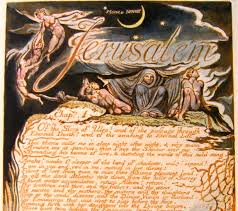
The song’s four verses seem disconnected in terms of any obvious narrative. There are shifting time frames and locations, taking us …all the way from New Orleans to New Jerusalem… presenting us with a symbolic landscape of the African American experience. It has been argued that the song does not seem to be really ‘about’ Blind Willie McTell. However, Dylan uses a towering figure in the history of the blues as an appropriate symbol of a form of music which signified both a resistance to and a way of coping with racist oppression in the United States. The blues has sometimes functioned as the conscience of America; a form of truth-telling countering the mainstream mythology of the ‘American Dream’. Blind Willie McTell is a different kind of dream, reaching ever further back into American history. We are presented with the image of a lonesome …hoot owl singing/ As they were taking down the tents… with highly evocative imagery …the stars above, the barren trees, were his only audience… Are the tents being taken down after a show by Blind Willie himself? Or is this some kind of religious ‘revival’ meeting?

Later we are taken even further back, into the time of slavery. The narrator draws us into another graphic scene: …See them big plantations burning… suggests a scene from the Civil War, and …hear the cracking of the whip… depicts the brutality of slavery itself, presented in ‘real time’. We get a little southern colour here: …Smell that sweet magnolia blooming/ See the ghosts of slavery ships… Then we are transported to the 1920s: …There’s a woman by the river/ With a fine young handsome man/ He’s dressed up like a squire, bootleg whiskey in his hand… We can hear a chain gang hollering in the distance. Dylan presents various tableaux of the black experience over time. Finally he lands in the present day, in a clear reference to the song’s musical origins …gazing out the window/ Of that old St. James hotel….

Whereas the original recording has a certain ethereal quality, tonight’s performance is thoroughly grounded. Dylan arranges the historical images of America like a movie maker using jump cuts, bringing the song to a highly dramatic climax with the final …Nobody can sing the blues like Blind Willie McTell… Then the harmonica is raised and he plays out another verse instrumentally. The song is one of his most impressive uses of the kind of compressed language that he began perfecting around the time of John Wesley Harding, combined here with the post-impressionistic narrative techniques he explored on Blood on the Tracks. Although it eulogises one of the great blues masters, it is not a conventional blues song. It is implicitly a song about how to sing the blues, about the singer’s struggle to ‘carry himself like Big Joe Williams’ and to summon the spirit of that ‘lonely hoot owl’ whose voice is addressed only to the ‘stars above’. Heaven, it declares, will hear Blind Willie in the spirit of that owl, even though the man himself spent much of his life in abject poverty. Blind Willie was an unrecognised genius, and Dylan here summons up all his strength to sing that genius into eternity. The song is a kind of invocation, which defiantly declares that the eternal muse of poetry will always triumph in the end. There are many twists and turns on the spectral highway on which that chain gang is always marching, but the phantoms of their cries will hover in the air forever.
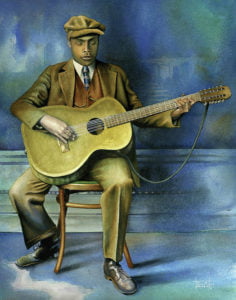
BLIND WILLIE McTELL
… and this is my take on the utterly wondrous STANDING IN THE DOORWAY…
Standing in the Doorway, another song from Time Out of Mind, is undoubtedly one of Dylan’s saddest songs. It is a ballad of romantic disillusionment which is influenced by the sensibilities of the blues. But its musical form is closer to that of country. The tune is a slow waltz, dominated by double bass and plaintive steel guitar. The song has been performed fairly often in concert but Dylan has offered few musical and lyrical variations. On Time Out of Mind, in what is almost certainly a live studio take, he showcases his mature vocal style to near-perfection in a ‘straight up’ performance worthy of the great country singers. The emotions in the song are complex and ambiguous but he conveys them with great dexterity through his dramatic phrasing and detailed vocal nuances.
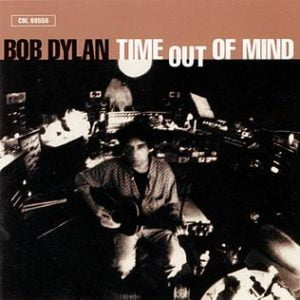
The narrator resembles the archetypal ‘drifter’ found in many country songs. Like the singer in Waiting for a Train he may well be ‘a thousand miles from home’. He stands at the entrance to some lowlife juke joint, strumming his guitar for a few coins. There are hints that – like the protagonist of Cold Irons Bound and many country songs – he has committed a serious violent crime and is ‘on the run’. Dylan relates all this soberly and philosophically, with great dignity. To some extent the song is reminiscent of classic country songs of heartbreak like Roy Acuff’s Blue Eyes Cryin’ in the Rain, or Dolly Parton’s I Will Always Love You, in which the narrators do not attach blame onto the lover who has left them but accept the situation with great stoicism. Standing in the Doorway depicts the singer’s desolation as a kind of spiritual crisis and we get the feeling that only his faith in his maker is preventing him from sinking into suicidal despair. Yet he is not attempting to present us with any moral lessons. He appears to hold out no prospect of any kind of redemption.
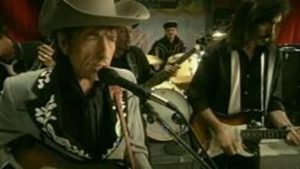
A sense of mental confusion is evident from the beginning. The first few lines show us that, as far as he is concerned, reality has already been distorted. It is a summer night and a juke box is playing softly in the background …Yesterday everything was goin’ too fast/ Today it’s movin’ too slow… he tells us, in a mournful tone which suggests infinite regret. He delivers the ‘shocking’ line …Don’t know if I saw you I would kiss you or kill you… with nonchalance, adding that …It probably wouldn’t matter to you anyhow… Thus we can sense that the apparent threat of violence, while it may express the mixture of yearning and anger he feels, is really nothing but a form of expression of how pitiful his situation really is. Each of the five verses has …You left me standing in the doorway crying… as the penultimate line, but every final line is different, as if the narrator is trying to come to some kind of definite conclusion but cannot really make up his mind. Here he informs us that …I got nothing to go back to now… reinforcing the sense that he is hovering in front of some kind of destiny but is afraid to step towards it. Perhaps the ‘doorway’ opens into death, or maybe it will lead to new hope. But he seems to be caught in a kind of emotional paralysis. Thus he will never be able to open the door.
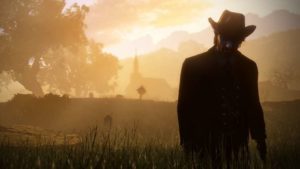
There is a suggestion that he is in some kind of drunken stupor. We hear that …The light in this place is so bad/ Makin’ me sick in the head… but we must know it’s not really the poor light that’s doing this …All the laughter is just making me sad… he tells us, reinforcing the impression that the doorway leads into a lively bar where people are socialising and having fun. But then he seems to look upwards, as if asking for some kind of salvation. As he does so, we are presented with a series of impressionistic ‘snapshots’. In one of the song’s most heart stopping moments Dylan draws in a little breath and sings: …The stars have turned cherry red… Cherry Red is a well known blues song, recorded in 1939 by Big Joe Turner and later by many others. In a clearly sexual ‘come on’, Turner tells his lover to …squeeze me pretty baby till my face turns cherry red… But here this image is transformed. Although it retains its blues connotations, the ‘red stars’ are clearly another hallucinatory vision in the narrator’s mind. Significantly, this reference is the only flash of colour in what is otherwise a ‘monochrome’ vista. The narrator, it seems, has ‘blood in his eyes’.
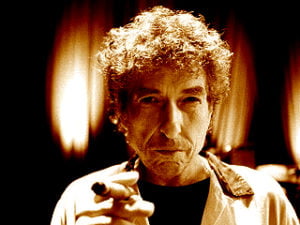
SMOKIN’ A CHEAP CIGAR…
The next two lines are quite beautifully compressed and imagistic …I’m strumming on my Gay Guitar… Dylan sings in a leisurely manner, before pausing to add …smokin’ a cheap cigar… The striking alliteration of ‘Gay Guitar’ is quite disarming. It appears to suggest the ‘old fashioned’ meaning of ‘gay’ as carefree and happy. In fact a ‘Gay Guitar’ is a specially designed instrument, often decorated ornately with flower patterns, which was popular with country singers in the 1950s and ‘60s. It was created by an instrument maker called Frank Gay. This contrasts neatly with the ‘down and dirty’ graphic image of a ‘cheap cigar’. Then the narrative changes tone. Dylan draws the syllables out to create emphasis, further giving us an impression of a dream like state …The ghost of our old love has not gone away/ Don’t look it like it will anytime soon… he muses and ends the verse in a typically romantic location ….under the midnight moon…. Now we can see a clear image of the singer, his beautiful guitar in hand, wreathed in thick smoke, like a figure in a film noir movie. The narrator then appears to share a confidence with us: …Maybe they’ll get me and maybe they won’t/ But not tonight and it won’t be here… This again suggests that he may be some kind of outlaw. It is certainly not made clear who ‘they’ are. But from here on, he seems to be beset by feelings of approaching doom. It may be that he has killed the woman he is singing about. After all, he said he wasn’t sure whether to kiss her or kill her… But given his hallucinatory state, it is difficult to be sure about this. However, the next lines seem to indicate that he fears his end will be coming soon: …There are things I could say, but I don’t/ I know the mercy of God must be near…
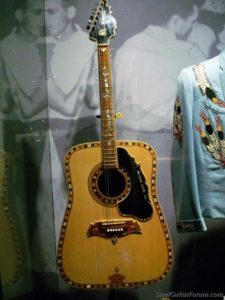
A GAY GUITAR…
In a number of country songs, men who have committed serious offences make a full confession of their own sinfulness. In Merle Haggard’s Mama Tried the narrator relates how he was drawn into crime at a young age despite his mother’s heroic attempts to save him from such a life. Similarly, in Johnny Cash’s harrowing cowboy ballad Don’t Take Your Guns to Town the young man ignores his mother’s pleas to stay away from guns and ends up being shot down. The narrator of Standing in the Doorway is contemplating the nature of mortality. We may speculate as to whether the phrase ‘the mercy of God’ as used here indicates a premonition of death or predicts possible salvation, in either an earthly or a heavenly sense. It seems that the song’s protagonist may be experiencing the same confusion. When he tells us …I’ve been ridin’ the midnight train/ I got ice water in my veins… is he therefore a cold blooded killer? This is hard to believe, as he angrily accuses the absent lover of leaving him …suffering like a fool… So the intimations of violence may be mere bravado. The much-used blues motif of ‘the midnight train’ may be another suggestion that the rider is travelling to imminent physical or spiritual death.
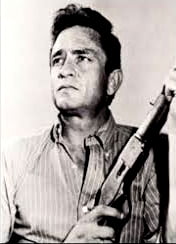
DON’T TAKE YOUR GUNS TO TOWN…
The rest of the song is dominated by a sense of encroaching doom. The narrator appears to be talking to himself and may be predicting his own death: …When the last rays of daylight go down/ Buddy, you’ll roll no more… The colloquial use of ‘buddy’ is particularly affecting, as if the narrator appears to be consoling himself. Despite the overall pessimism of the lyrics, the song is characterised by a tenderness which is conveyed quite explicitly in Dylan’s sweetly reflective delivery. Yet it still seems as if the narrator’s fate is pre-determined. As the night closes in he is now thinking aloud about his own funeral: …I can hear the church bells ringin’ in the yard/ I wonder who they’re ringin’ for?… In perhaps the most heartbreaking line the singer shares with us that …Last night I danced with a stranger/ But she just reminded me that you were the one… The waltz rhythm of the tune is particularly effective – helping us to picture the sad, slow dance in the rundown juke joint. The final image in the verse, when he tells us that she left him crying …in the dark land of the sun… is of course paradoxical, but it seems to refer back to the opening …last rays of daylight… The singer is trapped in that moment when the sun disappears over the horizon – a ‘twilight zone’ in his mind, identified here as that aching feeling of regret we experience after a gorgeous, unique sunset. Here Dylan transforms romantic disillusionment into a kind of transient ethereal beauty, leaving an aching in our hearts. Rarely has romantic regret been conveyed so graphically or so movingly.

THE DARK LAND OF THE SUN…
The first lines of the final verse …I’ll eat when I’m hungry, I’ll drink when I’m dry… are borrowed from the traditional American folk ballad (I’ve Been a) Moonshiner, the song of an unrepentant liquor bootlegger which Dylan sometimes performed live in his Greenwich Village years. His impassioned delivery on the studio version of this song (recorded in 1963 and released on The Bootleg Series Volume One) is characterised by the way he sustains specific notes to create a compelling mixture of beauty and tension, in one of his finest ever recorded vocal performances. The narrator of the song is in many ways a ‘lost soul’, who makes no excuses for himself and laments his descent into alcoholism with great pathos. But he is also a philosopher, who ends by declaring that …The whole world’s a bottle/ And life’s but a dram/ When the bottle gets empty/ It sure ain’t worth a damn… The spirit of that uniquely compelling performance is transmuted into Standing in the Doorway, with its riveting juxtaposition of graceful anguish and personal tragedy. The song ends with a confession and a testament. The imagery becomes extraordinarily graphic: …Even if the flesh falls off of my face/ I know someone will be there to care… Already the narrator seems to be looking beyond his own death – his immersion into ‘the dark land of the sun’. Yet he seems to find some mysterious consolation. The next lines are exquisitely tender in their simplicity: …It always means so much/ Even the softest touch… This is contrasted with the way he suddenly pulls back emotionally in the disclaimer …I see nothing to be gained by any explanation/ There’s no words that need to be said… In the end he remains stoical, taking us back to the refrain and ending with a common phrase which ‘wraps up’ his predicament neatly and shows us that he sees no way out of it: …Blues wrapped around my head…
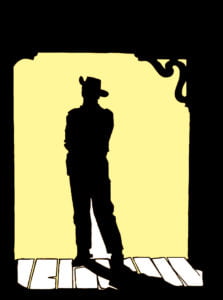
On Time Out of Mind, Dylan showed that he had devised a new approach to his music, which was the product of his immersion in the eerie strangeness of old folk songs, the emotional honesty of country music and the sly ambiguity, stoic acceptance of fate and transformational joy of the blues. In Standing in the Doorway all these elements come together as Dylan uses romantic disillusionment as a path to spiritual wisdom. The magic of the song comes from the fact that, despite being devastated by events, the narrator can rise above them through the pure beauty of his expression – thus spilling out the contents of his soul. The narrator here is almost certainly a sinner, quite possibly one beyond redemption. He may even be a cold blooded killer. But the feelings he expresses can be felt quite tangibly by the listener. The song deals with universal, elemental, emotions. Although it provides no easy answers and leaves us in a kind of limbo, it confronts Dylan’s crisis of inspiration with unswerving courage, by dealing with basic existential questions. It also asks whether life itself is worth living. Its narrator stands in a doorway that leads to the ‘undiscovered country’ of ‘the world beyond’. He delivers his soliloquy like a combination of one of Clint Eastwood’s hard-bittern western anti-heroes and a down-at-heel Hamlet, his face covered by a cowboy hat, strumming that Gay Guitar, forever wreathed in a cloud of dense smoke from that two-bit cigar.
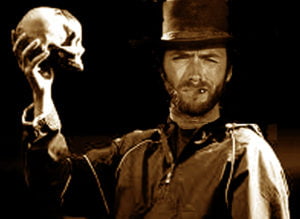
Feel free to make some comments below….
DYLAN LINKS
DAILY DYLAN NEWS at the wonderful EXPECTING RAIN
THE BOB DYLAN PROJECT- COMPREHENSIVE LISTINGS
THE CAMBRIDGE BOB DYLAN SOCIETY


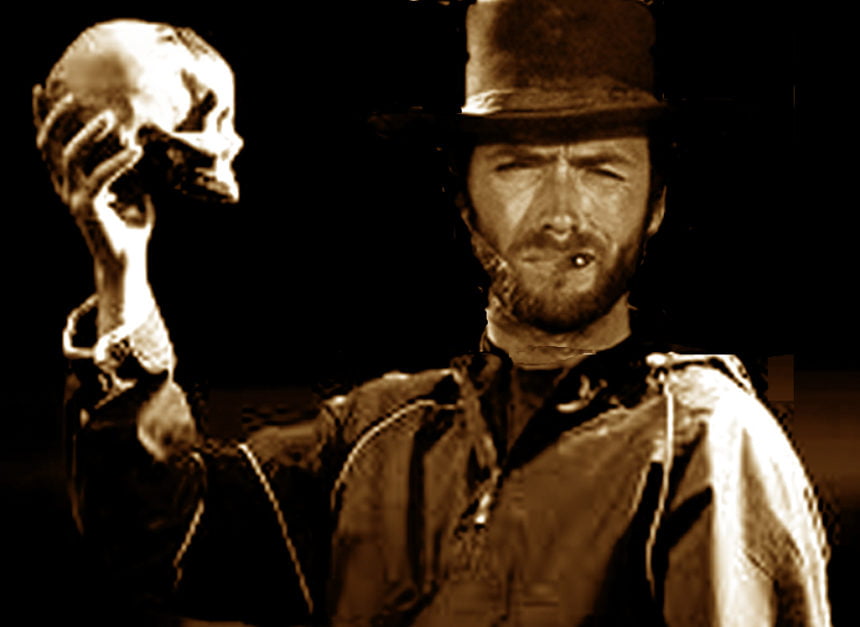
Leave a Reply